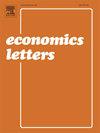Ultimatum bargaining: Algorithms vs. Humans
IF 2.1
4区 经济学
Q2 ECONOMICS
引用次数: 0
Abstract
We study human behavior in ultimatum game when interacting with either human or algorithmic opponents. We examine how the type of the AI algorithm (mimicking human behavior, optimising gains, or providing no explanation) and the presence of a human beneficiary affect sending and accepting behaviors. Our experimental data reveal that subjects generally do not differentiate between human and algorithmic opponents, between different algorithms, and between an explained and unexplained algorithm. However, they are more willing to forgo higher payoffs when the algorithm’s earnings benefit a human.
最后通牒谈判:算法与人类
我们研究了人类与人类或算法对手互动时在最后通牒博弈中的行为。我们研究了人工智能算法的类型(模仿人类行为、优化收益或不提供解释)和人类受益人的存在如何影响发送和接受行为。我们的实验数据显示,受试者一般不会区分人类对手和算法对手、不同算法、已解释算法和未解释算法。然而,当算法的收益有利于人类时,他们更愿意放弃更高的回报。
本文章由计算机程序翻译,如有差异,请以英文原文为准。
求助全文
约1分钟内获得全文
求助全文
来源期刊

Economics Letters
ECONOMICS-
CiteScore
3.20
自引率
5.00%
发文量
348
审稿时长
30 days
期刊介绍:
Many economists today are concerned by the proliferation of journals and the concomitant labyrinth of research to be conquered in order to reach the specific information they require. To combat this tendency, Economics Letters has been conceived and designed outside the realm of the traditional economics journal. As a Letters Journal, it consists of concise communications (letters) that provide a means of rapid and efficient dissemination of new results, models and methods in all fields of economic research.
 求助内容:
求助内容: 应助结果提醒方式:
应助结果提醒方式:


